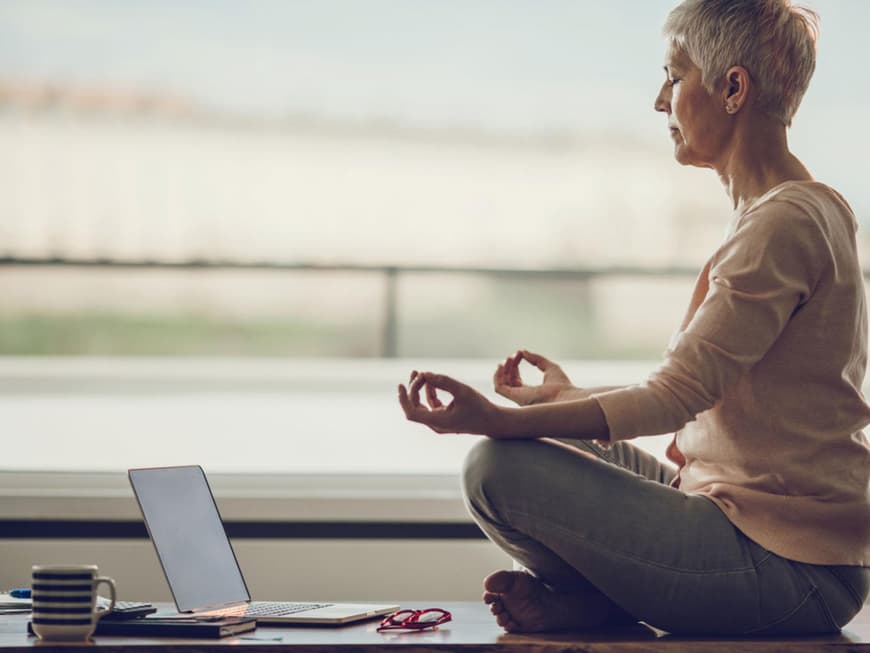Too high demands on yourself and deadline stress in your free time ... If you are constantly running at full speed, the healthy balance between challenge and relaxation is lost. You become restless, unfocused, close to the water or grumpier than usual. In a forsa survey commissioned by Weleda Trendforschung, 64 percent of respondents stated that they react irritably to stress, 40 percent are restless and nervous, 22 percent have emotional problems, not to mention physical symptoms such as tension or high blood pressure. Exercise is ideal for reducing stress. But you can't always just leave your desk. However, there are little tricks that you can use to relax and recharge your batteries within five to ten minutes.
Reducing frustration
When you need to get anger under control quickly ...
Anti-stress ball: The ideal tool when things get heated again. The little crumpled balls are a great way to release frustration by throwing them against the wall, kicking them with your foot or squashing them together.
A (office-suitable) relaxation exercise from progressive muscle relaxation works in a similar way: inhale and clench your hands tightly into fists, hold the tension briefly, exhale and release the tension again. Repeat 10 times. The trick lies in the alternation of tension and relaxation - an elegant method for quickly releasing inner tension.
Inner harmony
When you are out of balance and how to get back into balance ...
Mini meditation: A simple breathing meditation is a good lifeline when everything around you threatens to sink into chaos or the carousel of thoughts is difficult to stop. To do this, sit up straight, close your eyes and focus your attention on your breath. Let it come and go, you can also say "in" when you breathe in and "out" when you breathe out. Try to feel how your chest and stomach feel. If your mind wanders: take note of distracting thoughts and keep focusing on your breath. At some point you will be so focused that you won't be able to think about anything else. After 10 minutes you will be more at peace with yourself again. (Further exercises in: "Meditation" by Dr. C Stock, with exercise CD, Trias).
Adaptogens - natural stress killers
If you suffer from stress-related exhaustion, you should try herbal adaptogens. These are substances that normalize bodily functions under constant stress, increase stress resistance and resilience and thus promote adaptation to extraordinary stress. Depending on what the body and soul need at the time, they have different effects in stressful phases: either relaxing, when you are spinning on the hamster wheel, or stimulating, when you are completely exhausted and can't pull yourself together to do anything.
Adaptogens are plants that have adapted to extreme environmental conditions such as cold, altitude, lack of oxygen or drought. These include exotic plants such as concentration-enhancing ginseng, the Asian reishi mushroom - a good sleep aid - or roseroot, which thrives in the Baltic states, Siberia and Scandinavia. It is said to ensure that less cortisol is released. These stress killers are available as capsules, powders and teas.
New energy
When you need to be fit ...
Alternate breathing: This exercise gives you an oxygen boost: Sit upright. Close your right nostril with your right thumb and breathe in through your left nostril for four counts. Close the left nostril with your ring finger and little finger. Raise your thumb and exhale through the right nostril for eight counts and then inhale for four counts. Close the right nostril with your thumb. Lift your finger and exhale eight counts through your left nostril. Repeat ten times.
Rest mode
If you want to spare your heart and nerves ...
Four-legged friends: Blessed are those who have a four-legged friend at home with whom they can cuddle. US studies have shown that cuddling a dog lowers blood pressure and heart rate. The cozy purring of a cat, which vibrates at low frequencies of around 25 Hertz, is also a great calming agent. Or watch fish in an aquarium (almost every Chinese restaurant has one): Watching them makes you drift off mentally, which lowers your heart rate and blood pressure.
You might also be interested in this:








